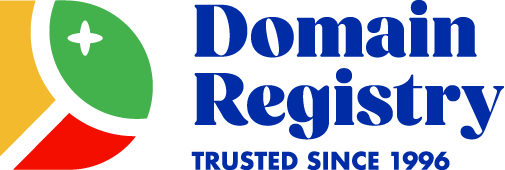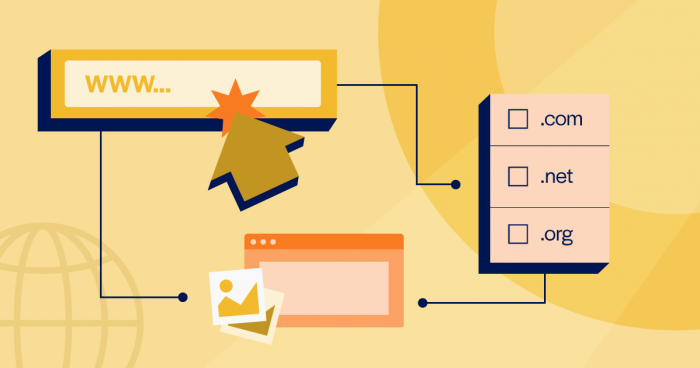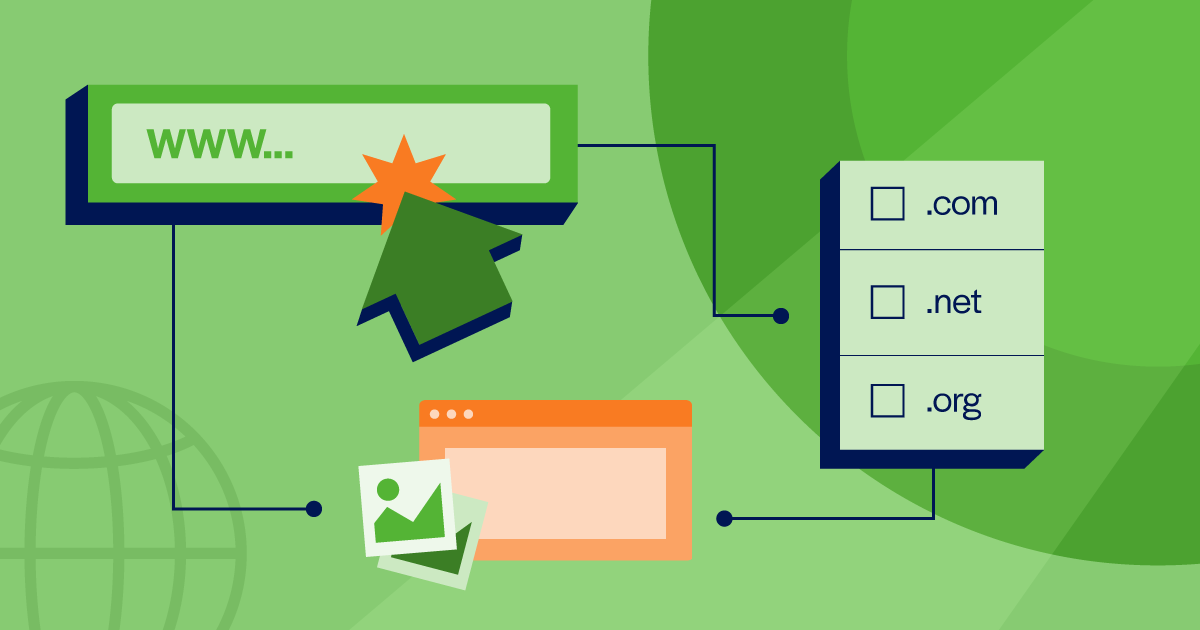The domain name you choose for your website can shape how people find you and how they understand your project’s goals. One central question when choosing a domain and establishing your online presence is whether to focus on branding or on keywords for your website’s address. This is the difference between a name that emphasizes who you are as opposed to what you do.
We’re here to help you understand the nuances of branded and keyword domains so that you can make an informed decision. Because a domain name is not just an address—it’s your business’s digital identity.
What is a Branded Domain?
A branded domain, or brandable domain, is a domain that incorporates your brand name or a variation of it. For example, if your business is an organic coffee shop called Red Moon Cafe, your branded domain name could be something like RedMoon.net or RedMoonCafe.com. The emphasis is on creating a unique and memorable domain name that directly reflects a brand that you’ve already built up or that you’re working to establish alongside your new website.
Advantages of Branded Domains
Most large companies that are household names, like New Balance, Ford, or Yeti, use branded domains—their website is their brand name with a TLD (or top-level domain, like “.com”) attached to it. It’s what people will be searching for when they go to find those companies’ websites. Here are a few reasons why branded domains work and why you should consider using one:
Builds Brand Awareness
A branded domain name reinforces your brand’s identity and creates recognition within your target audience and customer base. It’s easier for site visitors to remember and associate your website with the name of your project or business.
Projects Credibility
Having a branded domain lends credibility to your website. It conveys professionalism and trustworthiness, which can strengthen your relationship with your target audience.
Provides Room to Grow
Branded domains offer flexibility in terms of scalability and future company growth. As your business expands into new services or territories, your domain name adapts, meaning you won’t have to purchase additional domains later.
Protects Your Brand
Securing your brand name as a domain helps protect it from potential misuse by competitors or cybersquatters. Branded domains safeguard your business’s reputation and can help prevent confusion for your customers and clients.
Drawbacks of Branded Domain Names
Branded domain names aren’t for everyone. Really consider your target audience and how they go about searching for your products or services on the web.
SEO Challenges
Branded domain names don’t inherently have keywords that are related to what your business does, which can create challenges in terms of search engine optimization (SEO). But SEO isn’t the be-all-end-all way to get people to your site—this issue can be overcome with strategic content creation and link-building efforts.
Brand Establishment
If your brand is relatively unknown still, or if your brand name is a common word (think Penguin books or Brother printers), it may take some extra time and effort to establish recognition and authority in your field with a branded domain.
Unclear Message
If there is no keyword in your websites URL hinting at what it is your company does, it may not be obvious to site visitors or search engine users. You could miss out potential clicks and sales.
What is a Keyword Domain?
In contrast to branded domains, keyword domains, or keyword-rich domains, contain keywords or phrases that directly relate to what’s on the website. For example, our Red Moon Cafe above might choose a keyword domain like DallasOrganicCoffee.com or LateNightCafe.net, just like a website selling knit wool socks would choose KnitWoolSocks.net, regardless of what the business’s name was.
Advantages of Keyword Domains
Keyword domain names may not be used as much by big-shot businesses, but they have a lot to offer for businesses who want to get people to their site and to clearly communicate what they’re offering.
Increases Click-Through Rates
A keyword-rich domain name may attract more clicks from users who are searching for specific products and services online. A domain name stating exactly what your business does can tell users that your site is related to what they’re looking for.
Clarifies Your Message
When potential clients see your domain name or land on your site, they’ll know right away what it is your business does and offers. This creates a much better user experience on your site, because people aren’t having to take the extra time to figure out what your main focus is.
Drawbacks of Keyword Domains
It is possible that a keyword domain isn’t what’s best for your long-term plans, so consider what future growth you expect for your business and research upcoming trends you see emerging that you could expand into.
Brand Recognition
While keyword domains are descriptive and clear, they lack the distinctiveness and memorability of branded domains. This could make it challenging to tell the difference between your website and a competitor’s and could make it harder to build a strong brand identity.
Less Flexibility
Keyword domains are often more restrictive in terms of scalability and expansion. If your business grows beyond the scope of what you’ve chosen as a domain name, you might find yourself having to rebrand or register additional domains. If Red Moon Cafe wants to expand their chain to Austin, they would need a new domain name, like AustinOrganicCoffee.com, or would need to completely start over with a new domain that encompassed both areas, like TexasOrganicCoffee.com.
Find a Good Balance
Ultimately, the decision between a branded domain and a keyword domain depends on a few key factors: your branding strategy, your target audience, and your site’s long-term goals. In most cases, striking a balance between the two approaches will give you the best results.
Using Both
It’s possible to bring in both your brand name and a relevant keyword. Our cafe from earlier might choose RedMoonLateNiteCafe.net, RedMoonOrganicCoffee.com, or RedMoonDallas.com, depending on what kind of customers they were targeting. Just beware of domain names that get too lengthy.
Content Organization
Regardless of your domain choice, always focus on creating high-quality, relevant content that aligns with what your target audience is searching online for. This will help improve your website’s visibility and attract more organic traffic.
Link Building
Invest in link-building strategies to elevate your online visibility and your brand’s reputation, regardless of which kind of domain you choose. This involves getting other websites to link to the pages on your website, so you should always be fostering a good community with other brands and sites.
Next Steps: Choosing a Domain Name
Now that you’ve landed on whether you’ll go for a branded domain or a keyword domain, it’s time to nail down a domain name with confidence. Visit our post on great tips for choosing a domain name, and familiarize yourself with what to do if the domain name you want is taken. You also have access to our expert customer service, so don’t hesitate to get in touch with us if you have any questions.
Conclusion
The choice between a branded domain name and a keyword-rich domain name is a decision that should come after a true understanding of your project’s goals and your potential customer base.
While both approaches have their advantages, the key lies in understanding whether a strong brand identity or immediate SEO benefits are part of your long-term objectives. Regardless, the ultimate goal remains the same: to create a compelling online presence that drives meaningful engagement and growth.




